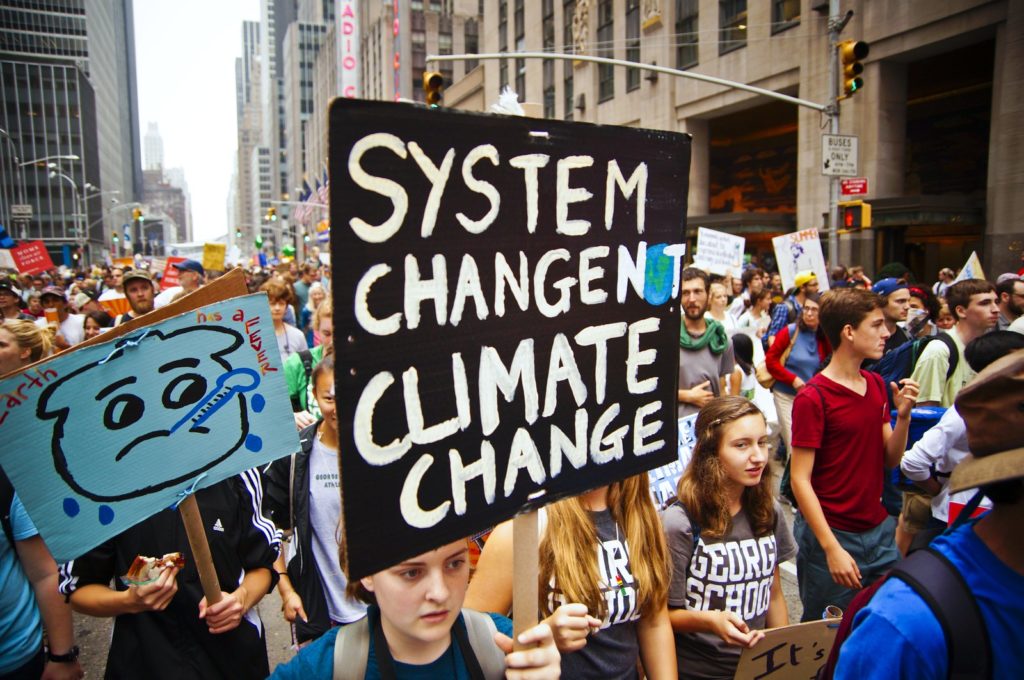A recent study, published in the Journal of Social Issues, criticizes the argument that human psychological barriers are to blame for inaction around climate change. They argue that these theories work to maintain the status quo for the elite who perpetuate harmful environmental policies. The authors, led by environmental activism researcher Michael Schmitt, expand on the influences of social context, power, and inequality on psychological processes. They see a role for psychologists in helping to visualize social change by narrating the human experience of climate change action.
“We consider the ways in which psychological responses to climate change are contingent upon the social-structural context, with particular attention to the ways unequal distributions of power have allowed elites to block climate action, in part by using their power to influence societal beliefs and norms,” they write.

“Why aren’t people taking action?” is a question that commonly arises in the discussion of climate change. The researchers reflect on this question first, by acknowledging the extant literature and perspectives of the field, largely understood through a “psychological barriers explanation” (PBE). They explain that this sort of psychological explanation “relies on a one-sided picture of human nature, delineating lists of psychological barriers without similar attention to aspects of human psychology that might facilitate action,” essentially, locating the problem of climate inaction within individual psychological processes.
Schmitt and colleagues propose a broader, more contextualized perspective, i.e. that human psychology exists within discourses, structures, and practices, and is often influenced by a small group of the most powerful and wealthy people.
“We take a critical social psychology approach to argue that psychological processes that deter climate action are too frequently abstracted from the larger social context, giving the impression that inaction is due to immutable aspects of human psychology and obscuring the potential for transformative social change,” they explain.
Critical social psychology considers systemic injustice and inequality as a product of the role of the social elite to continue serving their own interests, which, as the authors describe, is often difficult to see “because the system shapes so much human life that it appears normal.”
While there are individuals and groups within the system actively working to mitigate climate change, e.g. environmental organizations, indigenous communities, and youth climate activists, they hold less power in a neoliberal capitalist system than those wealthy institutions aiming to profit, e.g. the fossil fuel industry. The article uses as an example the story of Exxon withholding evidence of human-caused climate change they uncovered 40 years ago, while its executives attempted to delude the public and policymakers into thinking climate change did not exist.
Assigning the problem of climate change inaction to individuals curtails governmental responsibilities. Schmitt et al. delineate how psychological research can feed into that problematic perspective and propose that psychologists should instead hold themselves accountable for the narratives that are generated and their implications.
“When we, as psychologists, make theoretical or empirical arguments for why people do or do not take action to mitigate climate change, we are acting as agents in the co-construction of the human response to climate change.”
They conclude with action steps for future research. They recommend avoiding oversimplification, paying attention to social and political factors, acknowledging the power of the elite on climate change policy, identifying pathways for social change, and ultimately, “moving beyond the current focus on individual consumption and add to a growing body of research on environmental social movements, political participation, and social change.”
Schmitt, Neufeld, Mackay, & Dys-Steenbergen summarize how the current individualized psychological perspective neglects larger systemic action steps needed for change:
“We will not avoid climate disaster by limiting ourselves to individualized actions that work within the political and economic systems that made the catastrophic climate change possible in the first place. We need to consider alternative systems that address the problems with the system that is currently failing us.”
****
Schmitt, M. T., Neufeld, S. D., Mackay, C. M. L., & Dys-Steenbergen, O. (2019). The perils of explaining climate inaction in terms of psychological barriers. Journal of Social Issues 00(0), 1-13. https://doi.org/10.1111/josi.12360 (Link)















Thanks Hannah.
I read this and wonder if we have too much thought, too much language that attempts to put thought into words. Forever researching, using complicated thoughts, theories, making it appear as attempts at “something”.
Once you get to a scholarly level, it seems rational action, common sense don’t exist.
It is one of society’s preoccupations now, to study. Study each other, systems. In fact studies are profitable.
Am I missing something?
Report comment
Why is there such a push for individuals to do more? Because there is ZERO political will to hold the US Military (Industrial Complex) responsible for being the world’s worst polluter. 116 Democrats voted this week for the Military Defense Reauthorization Act so that the US Empire can continue dominating and polluting the world.
As long as voters continue to prioritize ONLY social issues such as abortion and kindergarteners right to transition- Dems for/Rethugs against- we will continue to get screwed by leaders who vote against ALL of our interests. Speaking of rich neoliberals screwing us over, please see the number of billionaire congresspeople. They don’t represent us. They are slowly killing us.
Here is my plan as an individual with very little control over the votes of rich sociopaths in Congress:
https://youtu.be/D2EC_N2-t1Y
Report comment
“Conscious grieving is an integral component of the maturity required to balance compassionate action with the discerning acceptance of our predicament.“
Oddly these feel like words I should hold onto for entirely different reasons. Thanks for the link too!
Report comment
Today, it’s more acceptable to have a tombstone that says how wealthy you were when we all went extinct than to actually exert some kind of effort to keep this from happening. Naturally, robots would make your grave site facilities because there’d be no people around to do it.
Report comment
Noah; “I’m telling you folk it’s going to rain”
Psychologist; “it seems to have something to do with the inability of people to trust what the weatherman is telling them. Perhaps if we change the narrative it might not rain”
Bob Dylan “It’s a Hard Rains a gunna fall”
Report comment
Yep Boans,
Noah made a HUGE mistake.
He took a psychiatrist on board.
Report comment
Reminds me of the scene in Dr Strangelove or How I learned to stop worrying and love the bomb where Dr Strangelove is explaining how we could select certain people for their physical attributes ……. and repopulate ze vorld affter ze nuclear holocaust.
Oh I see, Noah took a psychiatrist on board, of course Dr Do Little (for a lot of money).
Report comment
LOL boans
Report comment
“I wouldn’t count on the field of psychology to be anything more than a distraction.” That’s really all the field of psychology actually is. A bunch of delusions of grandeur filled, “omni potent moral busy body,” control freaks, here to attempt to control us, and distract us from our society’s real problems. Apparently so they may aid and abet in destroying America for the NWO satanists? Or so it seems.
The psychologists’ number one actual societal function, historically and today, is systemically distracting us from the real societal problems of child abuse, rape, and human trafficking. All while they – and their psychiatric partners in crime – actually systemically work to aid, abet, and empower the pedophiles and child sex traffickers.
https://www.madinamerica.com/2016/04/heal-for-life/
https://www.indybay.org/newsitems/2019/01/23/18820633.php?fbclid=IwAR2-cgZPcEvbz7yFqMuUwneIuaqGleGiOzackY4N2sPeVXolwmEga5iKxdo
https://www.amazon.com/Pedophilia-Empire-Chapter-Introduction-Disorder-ebook/dp/B0773QHGPT
https://community.healthimpactnews.com/topic/4576/america-1-in-child-sex-trafficking-and-pedophilia-cps-and-foster-care-are-the-pipelines
And all this psychological and psychiatric profiteering off of covering up child abuse, while they aid, abet, and empower the pedophiles and child sex traffickers is by DSM design.
https://www.psychologytoday.com/us/blog/your-child-does-not-have-bipolar-disorder/201402/dsm-5-and-child-neglect-and-abuse-1
I would imagine the psychologists are discussing climate change, in part, to distract us from their industry’s real life, systemic, historic and continuing, child abuse and rape covering up crimes. But this is largely why we’re now all living in a #MeToo world. Confess, repent, and end your evil ways, child rape profiteering psychologists and psychiatrists.
Report comment